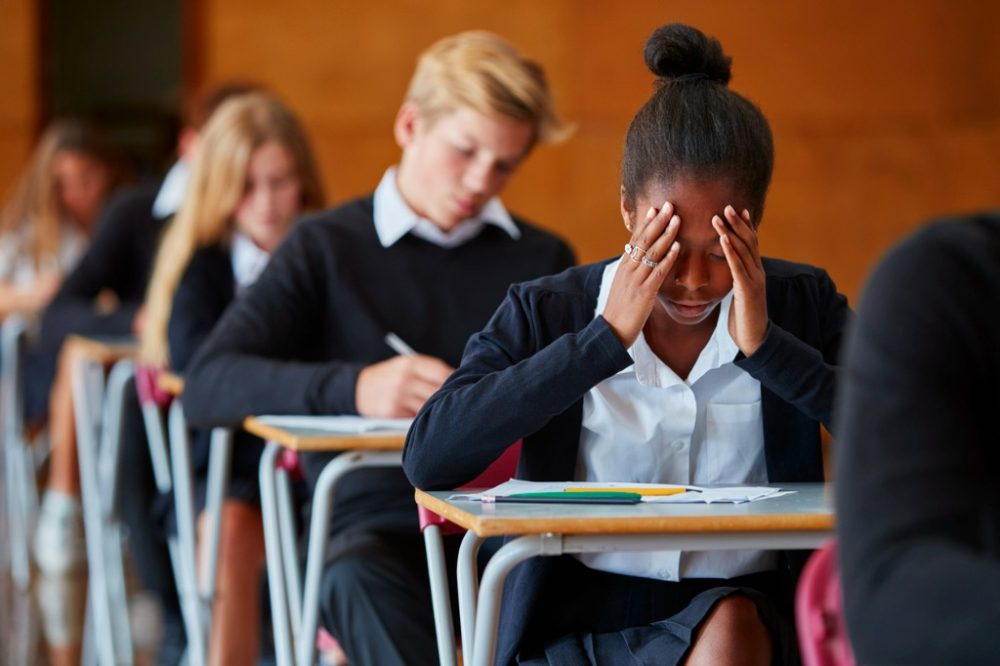Exams: Parents’ anger as mistakes in GCSEs and A-Level papers ‘distress’ UAE pupils and jeopardize results and university offers
A series of exam-board blunders in this year’s GCSE and A-Level exams papers have caused ‘distress’ to pupils who have already experienced severe educational disruption, according to UK examinations’ watchdog Ofqual [The Office of Qualifications and Examinations Regulation].
The move for exam boards to provide advance information (AI) to students about the content of upcoming papers was introduced this academic year for the first time to help students focus their revision, as a mitigation to allow for the Covid-related disruption to their studies.
But the AI has spectacularly backfired in several instances, with both an AQA A-level Law and GCSE Physics paper including high-marks questions on topics that students were specifically told they did not have to revise.
Further question marks were raised yesterday, when AQA issued an update on A-level Chemistry Paper 2, revealing that its contents may have been leaked in advance, putting some students at an unfair advantage.
Meanwhile an Edexcel Geography GCSE paper wrongly labelled an African country in one of its questions, while a Welsh exam board has apologised for there being completely missing pages from its English language and literature paper.
Such errors inflict unnecessary distress on students who are already grappling with the stress of their first public examinations after the previous two years’ exams were cancelled, say parents, echoing Ofqual’s damning verdict, all in a year that has also had its fair share of pandemic-related turmoil and anxiety for families.
One mother of an A-level student, who asked to remain anonymous, told SchoolsCompared:
“This is the last thing our children need after everything else they’ve had to deal with.”
“My daughter said she was completely thrown off by the circuits question in the Physics paper, which they had been specifically told they would not be tested on. She could hardly talk about it when she came home, she was so upset, and she’s terrified that she’s bombed the whole exam now.”
“It’s not fair on this year’s students. I think there should be more serious repercussions for the exam boards; how come it’s OK for them to make mistakes, when you know for sure our kids will be penalised for any mistakes they make?”
The head of exam-board regulator Ofqual, Dr Jo Saxton, told academy trust leaders at the Confederation of School Trusts conference:
“I recognise that there have been some real bumps in this road and I absolutely understand the distress that mistakes in advance information and exam papers cause.”
Exam board AQA has issued apologies for its mistakes, announcing that it would award full marks to all students for the erroneous questions in its Physics GCSE paper (which was worth nine marks) and the A-Level Law paper (which was worth 30 marks).
But parents have told SchoolsCompared that the exam mistakes have not only had a negative impact on those students sitting the erroneous papers, but they have also eroded pupils’ trust in the whole exam process – increasing teenagers’ already-high anxiety levels yet further.
Mother Tiffaney Howard, whose son was affected by the oversight on the GCSE Physics paper, told SchoolsCompared:
“They will all be awarded nine points for the question, which is fine.”
“But that doesn’t ease the panic the children went through when they were actually sitting that exam. Imagine you’ve been given your additional-information paper with all the topics on what is going to be included; that’s what 90% of the kids are focused on.”
“They might all be given nine points – but it’s the fact that they’ve panicked during the exam, and then come out of the exam feeling absolutely deflated.”
“It’s infuriating. It’s been so unfair on our kids.”
All of this comes in a year when school-leavers are facing unprecedented competition for university places – partially as a fall-out from the pandemic, and partially due to a mid-2000s baby boom, which is set to affect future years too. In some cases, the number of places at available at university have been more than halved.
To make matters worse, Ofqual’s Dr Jo Saxton also warned that this year’s grading guidance means that students will likely get lower grades than the previous pandemic years’ cohorts:
“We want to return to pre-pandemic grading, not least because this is best understood by the many users of qualifications.”
“[The] 2022 results are likely to be higher than in 2019, when summer grades were last determined by exams, but lower than we saw in 2021. This means that your schools are highly likely to find their results are lower than in 2021 when exams did not go ahead. Schools that get higher results than in 2021 will be few and far between, if any.”
So how has all of this been impacting schools and students in the UAE? We spoke to Matthew Burfield, Principal/CEO, GEMS Founders School – Dubai and Vice President – Education, GEMS Education to get the lowdown.
Do exam-board mistakes happen every year or are there more than usual in 2022?
“Public examinations have always gone through a very strict quality assurance process in my experience as a school leader. However, this year there are two main differences.”
“The first is that children have been exposed to a whole new way of assessment for the last two years and many have learned from that process, gaining a greater degree of understanding of the assessment criteria than they have ever had before.” “Secondly, the examination boards are trying to bring the entire system of formalised examinations back up to speed and, quite frankly, have become somewhat ‘rusty’.”
“It’s for these reasons that I believe we will see more errors and mistakes than in previous years as the exam boards retool to bring back the traditional ways of assessing children.”
What is your advice for students who believe there was a problem with the exam questions they were asked or that they were unfairly disadvantaged?
“There are processes and systems in place – certainly for GCSE and A-level examinations – to help support any students who feel they have been unfairly disadvantaged.”
“This could be as a result of personal issues such as being unwell, or exam papers not reflecting exactly what students have been told to expect.”
“My advice is simple: don’t spend time during the exam worrying about it or reporting it, as this will distract you for other content you can access.”
“Instead, raise your concern immediately after the exam with your exams officer and, if needed, formalise this in writing once you reach home.”
“Be clear about the issue you have faced and make reference to the relevant question or section of the paper. This will allow your exam officer to raise an appeal or a cause for concern with the board directly, so they can make a final judgement following an investigation.”
We are seeing rising numbers of Covid cases at the moment, and the UAE still has quarantine restrictions in place for those who test positive. How has Covid been affecting students’ exams this year?
“We have been fortunate that the impact has been minimal so far this year. And fortunately, there is a process in place for those children who are ill and cannot attend examinations, and we have followed this procedure in the few cases where children’s exam attendance has been impacted.”
Exam students have had it very tough during the pandemic and mistakes made by exam boards add unnecessary additional stress to an already stressful situation. Is this a statement you agree with?
“We have spent a lot of time considering the negative impact on young people as we emerge from the pandemic. It has clearly taken its toll in many ways, including in terms of social interaction and the development of interpersonal skills.”
“However, we also need to consider the positive impact, which has seen children successfully adapt and become incredibly resilient to change, approaching new situations with greater creativity than ever before.”
“Children have had the opportunity to realise the importance of having a physical connection to school, and although we have all improved our online skills, we have come to realise how much we missed seeing each other in person. Children missed those all-important interactions with their friends and peers and with their teachers.”
“With regards to any mistakes that are occurring in exams, this of course has the potential to knock a child off course. However, the skills they have gained throughout their schooling will, in my opinion, ensure they can respond to every outcome with resilience, enabling them to move on and not be shaken by a mistake.”
More on some of the issues raised by this article can be found here.
© SchoolsCompared.com. 2022. All rights reserved.















































































Leave a Response